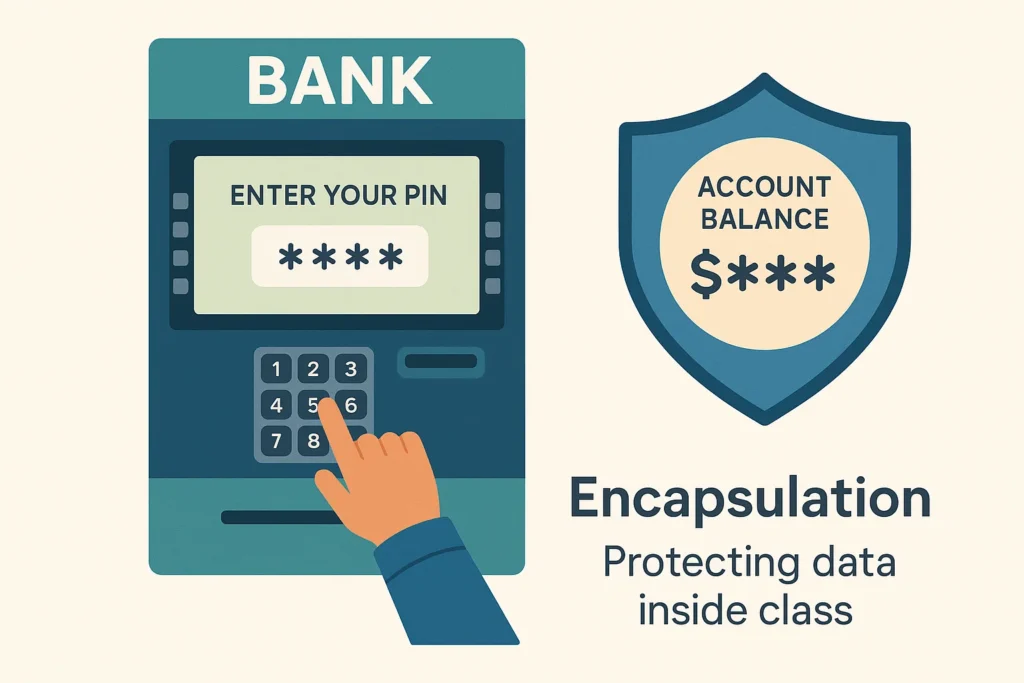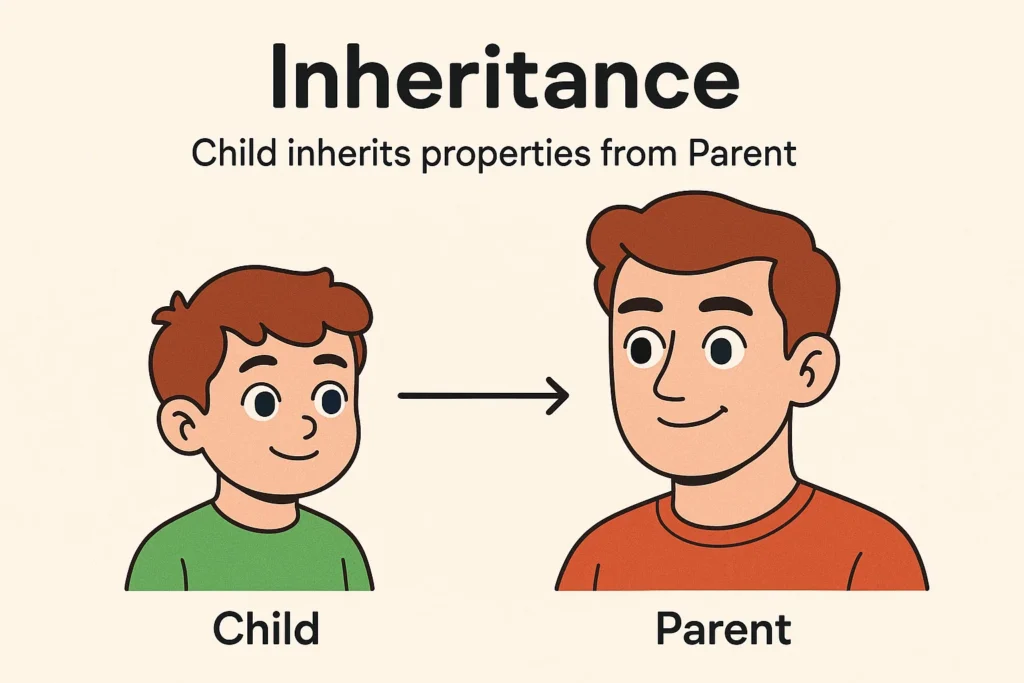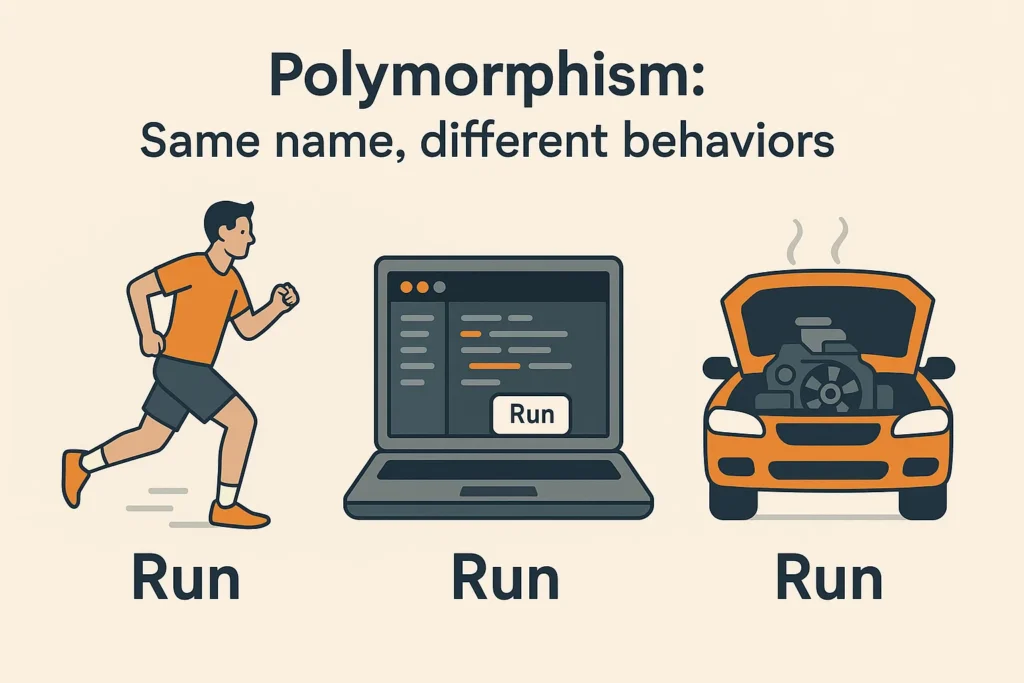
In today’s world, Object-Oriented Programming System (OOPS) is used almost everywhere — whether it’s making a mobile app, website, game, or big software. But many students and beginners get confused with technical words like “Class”, “Object”, “Inheritance”, etc.
What is OOPS?
Imagine you are running a school.
-
The school has many classes (like Class 1, Class 2, Class 3…).
-
Each class has many students.
-
Every student has details like name, age, roll number, etc.
Now in OOPS language:
-
The School is like a full program.
-
Each Class (like Class 1, Class 2) is a Class in programming.
-
Each Student is an Object created from that Class.
In simple words:
-
Class is a blueprint.
-
Object is a real thing created from that blueprint.
 Main Types of OOPS Concepts
Main Types of OOPS Concepts
Now let’s understand all types one-by-one, with easy real-life examples:
 Class
Class
 Real Life Example:
Real Life Example:
Think of a “Car Company” like Maruti or Honda. They make different models of cars.
-
The design plan for the car (blueprint) is called the Class.
-
Every individual car made from that plan is called an Object.
So:
-
Class = Blueprint
-
Object = Actual Car
 Code Example:
Code Example:
class Car:
def __init__(self, color, model):
self.color = color
self.model = model
def drive(self):
print(f"{self.model} is driving") Object
Object
 Real Life Example:
Real Life Example:
Suppose you made two cars from that blueprint:
-
Car 1: Red Honda
-
Car 2: Blue Maruti
Both are Objects of the same class Car.
 Code Example:
Code Example:
car1 = Car("Red", "Honda City")
car2 = Car("Blue", "Maruti Swift")
car1.drive()
car2.drive()
 Encapsulation
Encapsulation
Encapsulation means hiding private data inside the class so nobody from outside can change it directly.
 Real Life Example:
Real Life Example:
Think of a Bank Account. You can deposit or withdraw money through ATM (public methods), but you cannot directly change your bank balance (private data).
 Code Example:
Code Example:
class BankAccount:
def __init__(self, balance):
self.__balance = balance # private data
def deposit(self, amount):
self.__balance += amount
def get_balance(self):
return self.__balance Abstraction
Abstraction
Abstraction means showing only important things and hiding the unnecessary details.
 Real Life Example:
Real Life Example:
When you use a smartphone, you simply touch the screen to make calls or open apps. You don’t know how internally the circuits work. That’s abstraction.
 Code Example:
Code Example:
from abc import ABC, abstractmethod
class Phone(ABC):
@abstractmethod
def call(self):
pass
class Android(Phone):
def call(self):
print("Calling using Android phone") Inheritance
Inheritance

Inheritance means one class takes features from another class.
 Real Life Example:
Real Life Example:
Your parents have some qualities like eye color, hair color. You inherit these from them.
-
Parent Class = Father/Mother
-
Child Class = You
 Code Example:
Code Example:
class Parent:
def speak(self):
print("Parent is speaking")
class Child(Parent):
def play(self):
print("Child is playing")
obj = Child()
obj.speak()
obj.play() Polymorphism
Polymorphism
Polymorphism means same thing doing different jobs depending on where it is used.
 Real Life Example:
Real Life Example:
The word “run”:
-
A man runs on road.
-
A computer program runs.
-
A car engine runs.
Same word, different jobs.
 Code Example:
Code Example:
class Bird:
def sound(self):
print("Chirp Chirp")
class Dog:
def sound(self):
print("Bark Bark")
def make_sound(animal):
animal.sound()
b = Bird()
d = Dog()
make_sound(b)
make_sound(d)
 Composition (HAS-A Relationship)
Composition (HAS-A Relationship)
One object contains another object.
 Real Life Example:
Real Life Example:
A Car HAS-A Engine. Without engine, car can’t run.
 Code Example:
Code Example:
class Engine:
def start(self):
print("Engine started")
class Car:
def __init__(self):
self.engine = Engine()
def drive(self):
self.engine.start()
print("Car is driving")
myCar = Car()
myCar.drive() Benefits of OOPS
Benefits of OOPS
-
Code Reusability
-
Easy Maintenance
-
Real-World Modeling
-
Better Security
-
Saves Time & Effort
 Drawbacks of OOPS
Drawbacks of OOPS
-
Slightly difficult for beginners
-
Requires more design thinking before coding
-
Can be slow for very small programs
 Where OOPS is Used in Real Life
Where OOPS is Used in Real Life
-
Banking systems
-
E-commerce websites
-
Mobile Apps
-
Games
-
Healthcare Software
-
Social Media platforms
 Popular Languages Using OOPS
Popular Languages Using OOPS
-
Python
-
Java
-
C++
-
C#
-
Ruby
 Conclusion
Conclusion
OOPS (Object-Oriented Programming System) helps programmers create well-organized, real-world inspired, easy-to-maintain software. With simple concepts like class, object, inheritance, and polymorphism, OOPS is the future of programming in 2025 and beyond.
If you’re learning coding today, mastering OOPS is must-have knowledge.

